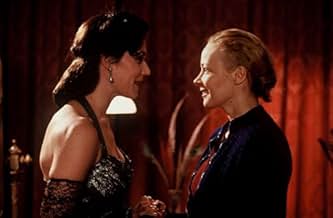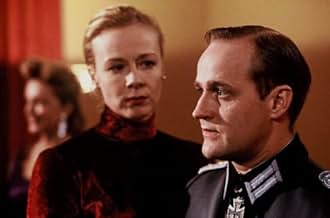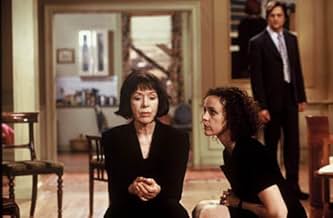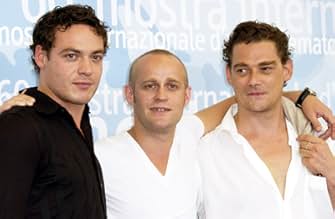NOTE IMDb
6,7/10
2,6 k
MA NOTE
Après le décès de son père, Hannah s'inquiète du comportement étrange de sa mère. Après des révélations sur l'enfance perturbée de sa mère, Hannah réalise qu'elle en savait très peu sur elle... Tout lireAprès le décès de son père, Hannah s'inquiète du comportement étrange de sa mère. Après des révélations sur l'enfance perturbée de sa mère, Hannah réalise qu'elle en savait très peu sur elle.Après le décès de son père, Hannah s'inquiète du comportement étrange de sa mère. Après des révélations sur l'enfance perturbée de sa mère, Hannah réalise qu'elle en savait très peu sur elle.
- Réalisation
- Scénario
- Casting principal
- Récompenses
- 9 victoires et 3 nominations au total
Avis à la une
I'm always surprised about how many times you'll see something about World War 2 on the German national television. You would think they don't like to open old wounds, but there isn't a week that goes by without a documentary or a movie about the horror and atrocities of this war. Perhaps it's a way of dealing with their past, I don't know, but you sure can't blame them of ignoring what happened. And it has to be said: most of those documentaries are really worth a watch because they never try to gloss over the truth and the same can be said about their movies (think for instance about "Der Untergang" or "The Downfall" as you might now it) which are also very realistic.
One of those movies is "Rosenstrasse". It tells a true story and deals with the subject of the mixed marriages during the war, even though the movie starts with a family in the USA, at the present day. After Hannah's father died, her mother all a sudden turned into an orthodox Jew even though she hasn't been very religious before. She doesn't know where the strange behavior of her mother comes from, but as she starts digging in her mother's troubled childhood, Hannah understands how little she has ever known about her mother's past.
The fact that this movie deals with the subject of the mixed marriages during the Nazi regime is already quite surprising. For as far as I know, there hasn't been another movie that deals with this subject. (For those who didn't know this yet: Being married to a so-called pure Aryian man or woman meant for many Jews that they weren't immediately sent to one of the concentration camps, but that they had to work in a factory). But it does not only tell something about the problems of the mixed marriages, it also gives a good idea of how these people were often seen by their own parents and relatives. How difficult it sometimes was for them during the Nazi regime and how these people, most of the time women, did everything within their power to free their men, once they were captured and locked away in for instance the Rosenstrasse...
The acting is really good and the story is very well written, although the way it was presented in the beginning didn't really do it for me (and that's exactly the only part that you'll get to see in the trailer). Perhaps it's just me, but I would have left out a big part of what happens in the present day. At least of the part that is situated in the USA, because the part where Hannah goes to Berlin and talks to someone who knows more about her mother's past, definitely works.
If you are interested in everything that has something to do with the Second World War, and if you aren't necessarily looking for a lot of action shots, than this is definitely a movie you should see. This isn't a movie in which you'll see any battles or gunfights, but it certainly is an interesting movie, because it gives you an idea about an aspect of the war only little is known of. I give it an 8/10.
One of those movies is "Rosenstrasse". It tells a true story and deals with the subject of the mixed marriages during the war, even though the movie starts with a family in the USA, at the present day. After Hannah's father died, her mother all a sudden turned into an orthodox Jew even though she hasn't been very religious before. She doesn't know where the strange behavior of her mother comes from, but as she starts digging in her mother's troubled childhood, Hannah understands how little she has ever known about her mother's past.
The fact that this movie deals with the subject of the mixed marriages during the Nazi regime is already quite surprising. For as far as I know, there hasn't been another movie that deals with this subject. (For those who didn't know this yet: Being married to a so-called pure Aryian man or woman meant for many Jews that they weren't immediately sent to one of the concentration camps, but that they had to work in a factory). But it does not only tell something about the problems of the mixed marriages, it also gives a good idea of how these people were often seen by their own parents and relatives. How difficult it sometimes was for them during the Nazi regime and how these people, most of the time women, did everything within their power to free their men, once they were captured and locked away in for instance the Rosenstrasse...
The acting is really good and the story is very well written, although the way it was presented in the beginning didn't really do it for me (and that's exactly the only part that you'll get to see in the trailer). Perhaps it's just me, but I would have left out a big part of what happens in the present day. At least of the part that is situated in the USA, because the part where Hannah goes to Berlin and talks to someone who knows more about her mother's past, definitely works.
If you are interested in everything that has something to do with the Second World War, and if you aren't necessarily looking for a lot of action shots, than this is definitely a movie you should see. This isn't a movie in which you'll see any battles or gunfights, but it certainly is an interesting movie, because it gives you an idea about an aspect of the war only little is known of. I give it an 8/10.
Rosenstrasse is more an intimate film than one of epic proportions, which could have kept away many film goers looking for a Pianist similar plot. Fortunately, Von Trotta, a good screenwriter, opts for a feminist peep to an era too much illustrated on its colorful exterior, but too little analyzed in terms of intimacy and from the point of view of ordinary Aryan German rather from a Jewish standpoint. Rosentrasse finds its strength in these unsung burdens of people trapped within historical circumstances of which they emerge as victims. The pace of the film is introspective, poignantly slow, meditative. Besides, the characters are so vivid while transitions between generations and the passing of time has been deftly crafted. Rosenstrasse is not a masterpiece, and some narrative flaws are well discerned. Another fault lies on a trivial cinematography unable to capture the intensity of the internal drama lived by the characters. Nevertheless, this film is worth seeing. Finally, Rosenstrasse is part of the last trend in German films dealing with the ghosts of a nightmarish past,trend that includes such excellent films as Nowhere in Africa, and recently, the controversial Downfall. I would recommend this film to those who know how to read beyond the images.
I went to see the movie for two reasons: 1) Katha Riemann was given a prize for her role in Venice and 2) The story - the rescue of hundreds of Berlin jews, who had been rounded up for deportation in the spring of 1943 - and were being kept by the Gestapo in Rosenstrasse (Rose Street) - is important. The deportation was halted by the non-jewish partners and friends who demonstrated in front of the detainment centre.
However, Trottas movie is extremely disappointing, a pamphlet put on celluloid. The movie is intended to be GOOD, the main characters are intended to be GOOD, the nazis are just EVIL, lustful or downright stupid. Maria Schrader is supposed to be a young jewish New Yorker, trying to understand the unspoken traumas of her German-born mother who survived Rosenstrasse - but never succeeds in convincing me, that she is American. (There is something about her body-language which is much too Continental). Extremely annoying is the use of German in the US scenes....spiced with a few choice english words or sentences which seem totally out of place.
Katja Riemann does add a bit more life to her character - a Preussian baroness and talented pianist, who rescues her jewish husband. (Does she really have to f*** propaganda minister Goebbels to get hubby away from Gestapo- and does Goebbels really have to be portrayed as a - cartoonish - lustful little salivating man, forever chasing a bit of tail, and so plainly disgusting).
We all know Goebbels was a war criminal - but it would have been so more interesting, if the characters were REAL people and the story not just a study in black and white with a stilted dialogue.
However, Trottas movie is extremely disappointing, a pamphlet put on celluloid. The movie is intended to be GOOD, the main characters are intended to be GOOD, the nazis are just EVIL, lustful or downright stupid. Maria Schrader is supposed to be a young jewish New Yorker, trying to understand the unspoken traumas of her German-born mother who survived Rosenstrasse - but never succeeds in convincing me, that she is American. (There is something about her body-language which is much too Continental). Extremely annoying is the use of German in the US scenes....spiced with a few choice english words or sentences which seem totally out of place.
Katja Riemann does add a bit more life to her character - a Preussian baroness and talented pianist, who rescues her jewish husband. (Does she really have to f*** propaganda minister Goebbels to get hubby away from Gestapo- and does Goebbels really have to be portrayed as a - cartoonish - lustful little salivating man, forever chasing a bit of tail, and so plainly disgusting).
We all know Goebbels was a war criminal - but it would have been so more interesting, if the characters were REAL people and the story not just a study in black and white with a stilted dialogue.
'A ray of light in hard times' - this is how one of the main heroines characterizes the events described in 'Rosenstrasse', the 2003 film directed by Margarethe von Trotta. The episode took place in February-March 1943 and was one of the few, if not the only, public protest in Nazi Germany against the deportation and extermination of the Jews. The demonstrations took place on Berlin's Roses Street (hence the name of the film) where hundreds of Jews who were to be deported to concentration and extermination camps were held in a former Jewish welfare center. They were organized by the non-Jewish wives of the arrested men, mixed couples having a special status in the context of the racial laws (the Nurenberg laws). This unique public display of solidarity with the Jewish population (albeit motivated by family ties) led to the release of about 1,800 Jews, most of whom survived the war. In German history, the episode is considered as proof that 'it could have been otherwise' and presented as one of the few moments of anti-Nazi civil resistance.
The screenplay (co-written by Margarethe von Trotta and Pamela Katz) is conceived as a journey into family history and rediscovery of identity that is undertaken more than 50 years after the war by Hannah Weinstein, a young Jewish New Yorker. Her mother, about whose biography the daughter knows very little, except that she came to the United States as a child after the war, seems to go through a crisis of identity radicalization, deciding to mourn her deceased husband according to the laws of Jewish orthodoxy and opposing vehemently Hannah's marriage to a young non-Jew. With the help of a cousin who came to her father's funeral, Hannah begins to retrace her mother's biography and discovers that the 8-year-old Jewish girl had been rescued and sheltered during the last years of the war by Lena Fischer, a woman descended from the German aristocracy, who in turn was married to a Jew. Lena still lives in Berlin, and Hannah will travel to meet her. From here, the story of the events in Rosenstrasse is reconstructed through flash-backs that visually translate the accounts of the woman who, almost 60 years ago, had participated in the protests to save her husband, had met and taken under her protection the Jewish girl, remained alone in the world after her mother's deportation.
Margarethe von Trotta is a multi-talented filmmaker - actress, screenwriter, director - who spent the first years of her career in the milieus of the French New Wave and then the German New Cinema, to establish herself in the following decades with films and roles in which she analyzes (especially) German history and brings into debate important figures and moments, some not without controversy. 'Rosenstrasse' is an important film in its very subject matter, but it is an uneven film in its achievement. The most powerful part seemed to me to be the individual stories that reconstruct destinies - many tragic - broken by war and the horrors of the Holocaust. It is the secondary characters, some of whom only appear in a scene or two, that have the best chance of remaining in the viewers' memory. The contemporary plot and especially the episodes set in America don't hold up as solidly and are based too much on stereotypes. As in all of the director's films, the prominent characters are women and the actresses are given the opportunity for solid roles. Maria Schrader (herself a remarkable director and actress) is excellent as the woman on a quest for the truth about her family history and her own identity. Katja Riemann and Doris Schade interpret the role of Lena at both ages with aplomb and dignity. I was less impressed by Jutta Lampe as the mother. The way her role is written does not clarify either her supposed identity crisis or the radical change that occurs towards the end. The episode of the flirtation with Goebbels, which would have led to the release of the prisoners, has been widely criticized, especially in Germany, because it appears to downplay the impact of the women's protests. I think these criticisms are justified, although it seems that, historically, it was indeed Goebbels who ordered the release of the prisoners. Franz Rath's cinematography differentiates the leaps into the past by shooting in gray and metallic shades, almost black and white. 'Rosenstrasse' remains an interesting and important film both for its subject matter and for the discussions it has generated and will continue to generate.
The screenplay (co-written by Margarethe von Trotta and Pamela Katz) is conceived as a journey into family history and rediscovery of identity that is undertaken more than 50 years after the war by Hannah Weinstein, a young Jewish New Yorker. Her mother, about whose biography the daughter knows very little, except that she came to the United States as a child after the war, seems to go through a crisis of identity radicalization, deciding to mourn her deceased husband according to the laws of Jewish orthodoxy and opposing vehemently Hannah's marriage to a young non-Jew. With the help of a cousin who came to her father's funeral, Hannah begins to retrace her mother's biography and discovers that the 8-year-old Jewish girl had been rescued and sheltered during the last years of the war by Lena Fischer, a woman descended from the German aristocracy, who in turn was married to a Jew. Lena still lives in Berlin, and Hannah will travel to meet her. From here, the story of the events in Rosenstrasse is reconstructed through flash-backs that visually translate the accounts of the woman who, almost 60 years ago, had participated in the protests to save her husband, had met and taken under her protection the Jewish girl, remained alone in the world after her mother's deportation.
Margarethe von Trotta is a multi-talented filmmaker - actress, screenwriter, director - who spent the first years of her career in the milieus of the French New Wave and then the German New Cinema, to establish herself in the following decades with films and roles in which she analyzes (especially) German history and brings into debate important figures and moments, some not without controversy. 'Rosenstrasse' is an important film in its very subject matter, but it is an uneven film in its achievement. The most powerful part seemed to me to be the individual stories that reconstruct destinies - many tragic - broken by war and the horrors of the Holocaust. It is the secondary characters, some of whom only appear in a scene or two, that have the best chance of remaining in the viewers' memory. The contemporary plot and especially the episodes set in America don't hold up as solidly and are based too much on stereotypes. As in all of the director's films, the prominent characters are women and the actresses are given the opportunity for solid roles. Maria Schrader (herself a remarkable director and actress) is excellent as the woman on a quest for the truth about her family history and her own identity. Katja Riemann and Doris Schade interpret the role of Lena at both ages with aplomb and dignity. I was less impressed by Jutta Lampe as the mother. The way her role is written does not clarify either her supposed identity crisis or the radical change that occurs towards the end. The episode of the flirtation with Goebbels, which would have led to the release of the prisoners, has been widely criticized, especially in Germany, because it appears to downplay the impact of the women's protests. I think these criticisms are justified, although it seems that, historically, it was indeed Goebbels who ordered the release of the prisoners. Franz Rath's cinematography differentiates the leaps into the past by shooting in gray and metallic shades, almost black and white. 'Rosenstrasse' remains an interesting and important film both for its subject matter and for the discussions it has generated and will continue to generate.
One thing that astonished me about this film (and not in a good way) was that Nathan Stoltzfus, who seems to pride himself on being the major historian on the topic of the Rosenstrasse, was one of the historians working on this film, considering how much of the actual events were altered or disregarded.
Another reviewer said that von Trotta said she never meant for Lena to bed Goebbels, but in that case, why did she give every impression that that was what had happened? Why not show other possible reasons for the mens' release, such as the disaster that was Stalingrad, or the Nazis' fear that the international press, based in Berlin, would find out about the protest.
Also, why did the whole storyline play second fiddle to a weak family bonding storyline that has been done over and over again? Surely something as awesome as this could carry its own history! In places, it was as if the film had two story lines that really seemed to have little in common.
Overall, this film failed in its aim, which was to draw attention to a little-known act of resistance, which is a shame, because done better, it could have had a major impact.
Another reviewer said that von Trotta said she never meant for Lena to bed Goebbels, but in that case, why did she give every impression that that was what had happened? Why not show other possible reasons for the mens' release, such as the disaster that was Stalingrad, or the Nazis' fear that the international press, based in Berlin, would find out about the protest.
Also, why did the whole storyline play second fiddle to a weak family bonding storyline that has been done over and over again? Surely something as awesome as this could carry its own history! In places, it was as if the film had two story lines that really seemed to have little in common.
Overall, this film failed in its aim, which was to draw attention to a little-known act of resistance, which is a shame, because done better, it could have had a major impact.
Le saviez-vous
- AnecdotesIt took Margarethe von Trotta almost 10 years to realize this project for financial reasons.
- ConnexionsFeatured in Katja Riemann (2006)
- Bandes originalesSonata for Piano and Violin in A
'Allegretto Moderato' - César Franck (op. 446 198 2)
Courtesy of UNIVERSAL CLASSICS & JAZZ - a division of UNIVERSAL MUSIC GmbH
Meilleurs choix
Connectez-vous pour évaluer et suivre la liste de favoris afin de recevoir des recommandations personnalisées
- How long is Rosenstrasse?Alimenté par Alexa
Détails
Box-office
- Montant brut aux États-Unis et au Canada
- 734 519 $US
- Montant brut mondial
- 6 075 609 $US
- Durée
- 2h 16min(136 min)
- Couleur
- Mixage
- Rapport de forme
- 2.35 : 1
Contribuer à cette page
Suggérer une modification ou ajouter du contenu manquant






































